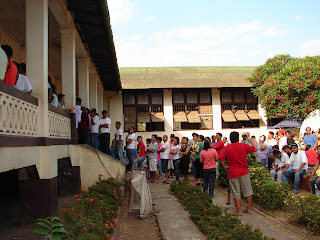
The People’s International Observer’s Mission (PIOM) consisted of 86 foreigners from 11 countries who monitored the first ever automated elections in the Philippines. We came from Australia, Canada, United States, United Kingdom, Japan, Hong Kong, France, Germany, Denmark and the Netherlands. And we visited Northern Luzon (Abra), Central Luzon (Pampanga/Tarlac), National Capital Region (Tondo/Payatas), Bicol (Daraga/Sorsogon),Southern Luzon (Quezon/Cavite), Western Visayas (Iloilo), Autonomous Region in Muslim Mindanao (Marawi City), (Davao) Lanao del Sur and Caraga. We were the largest foreign delegation ever to monitor the Philippine elections.

We convened first in Manila at the Orchid Garden Suites for briefing and general “need-to-know” type of stuff. I was feeling a bit intimidated due to the fact that I had decided to go on this mission without anyone that I know. I walked into the hotel conference room and was immediately greeted with warm hugs from members of the Secretariat. My fears began to subside and I found a seat with a table of incredibly friendly Canadians.

After spending a few days in Manila we seperated into teams and I joined my companions on a bus bound for Abra, in the beautiful mountains of the Cordillera. We arrived in Bangued, Abra at 4:00am and settled into our accomodations for a few hours sleep before our busy day ahead.


Our first day involved courtesy visits to the Philippine National Police (PNP), the Governor, the Congresswoman, a Lieutenant Colonel of the Philippine Army, and the Supervisor of COMELEC.

Below is a section taken from the report that my team compiled at the end of the mission:
The stated purpose of the elections was to have an open, clean, and fair process in determining the will of the majority. This process was compromised on several levels, and the integrity of the electorate’s will can be called into question. Specifically, we found evidence of: vote buying; negative campaigning; intimidation and harassment of voters and members of the PIOM team; a disproportionate and heavy military presence; comingling of state security forces with local candidates; breaches of security in the issuing of COMELEC identification passes; an atmosphere of fear; personal human rights violations in the outright occupation of people’s homes in Malibcong by the 41st IB, which is a direct violation of the sanctity of people’s personal space. The team itself was followed, photographed without permission, and questioned by the Army in terms of what our motives were. On more than one occasion, attempts were made to influence the neutrality of the team in an effort to draw the team into existing conflicts.

The majority of precincts did not open on time, and there were delays of as long as four hours because of technical problems with the PCOS machines. We discovered: extraordinarily long line-ups; in the actual precincts, a lack of control of the poll watchers; poll watchers influencing voters as they voted; unrealistic expectations placed upon the Board of Election Inspectors (BEI); a lack of privacy in casting votes; inadequate provisions for the elderly and the infirm, the BEIs and the general population; in many instances, people remained in line for as long ten hours in extremely high temperatures; in those instances when the machine failed, the absence of a contingency plan to secure the ballots; difficulty in the transmission of results from the precincts to the municipal canvassers, and from the municipal to the provincial canvassers.


The provincial canvassing was repeatedly rescheduled, and the final result came in three days after the end of voting. Failure of elections was declared in two municipalities, La Paz and Dolores.

One thing is certain, despite these abovementioned hardships and realities in Abra, the general population is fully engaged in the democratic process and has sought to make a difference by participating in the elections. However, until the underlying causes of extremely limited resources, poverty, alienation, and oppression of dissenting voices are remedied, conflict will continue no matter what system is used to elect representatives.

The use of the electronic machines did not produce its stated purpose. It did not improve efficiency. Voters were still intimidated. The lack of transparency and the breakdown of the communications system led to widespread speculation about vote manipulation in the areas we visited.
In all the COMELEC reports of peaceful elections, “peace” only referred to a lack of widespread, overt physical violence. But this was not a peaceful election. The Maguindanao Massacre for one is a large scale example of mass murder directly related to these elections. Furthermore, the PIOM team in Lanao del Sur witnessed a two-hour gunfight at the Tugaya Elementary School. The firefight killed one woman and wounded two others. The PIOM delegates were caught in the middle of the gunfire.


Given the number of extra-judicial killings, assassinations, and disappearances nationwide, my PIOM team expressed a serious concern for the personal safety and livelihood of those Filipino's who participated and supported our mission. They literally put their life on the line for a chance at democracy, and I will continue to hold them in prayer and ask that anyone reading this would do the same.
I am truly grateful for the opportunity to return to the Philippines and stand in solidarity with others in hopes of bringing about a positive change. No matter where I am in the Philippines, I always feel at home, and I believe I have left there a piece of my heart.
Surwe-e tet-e-wa a mos a e (The truth has been spoken).

